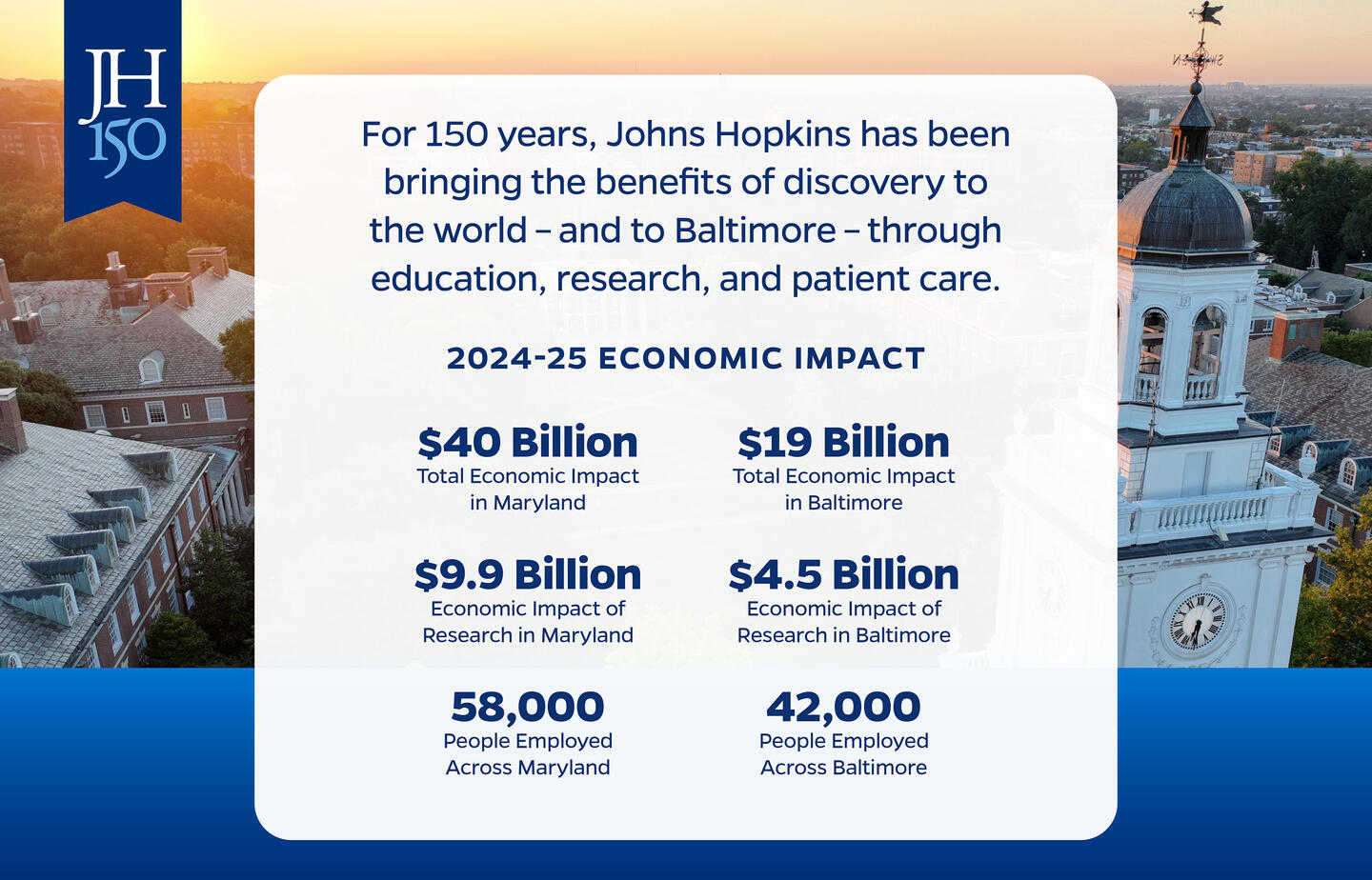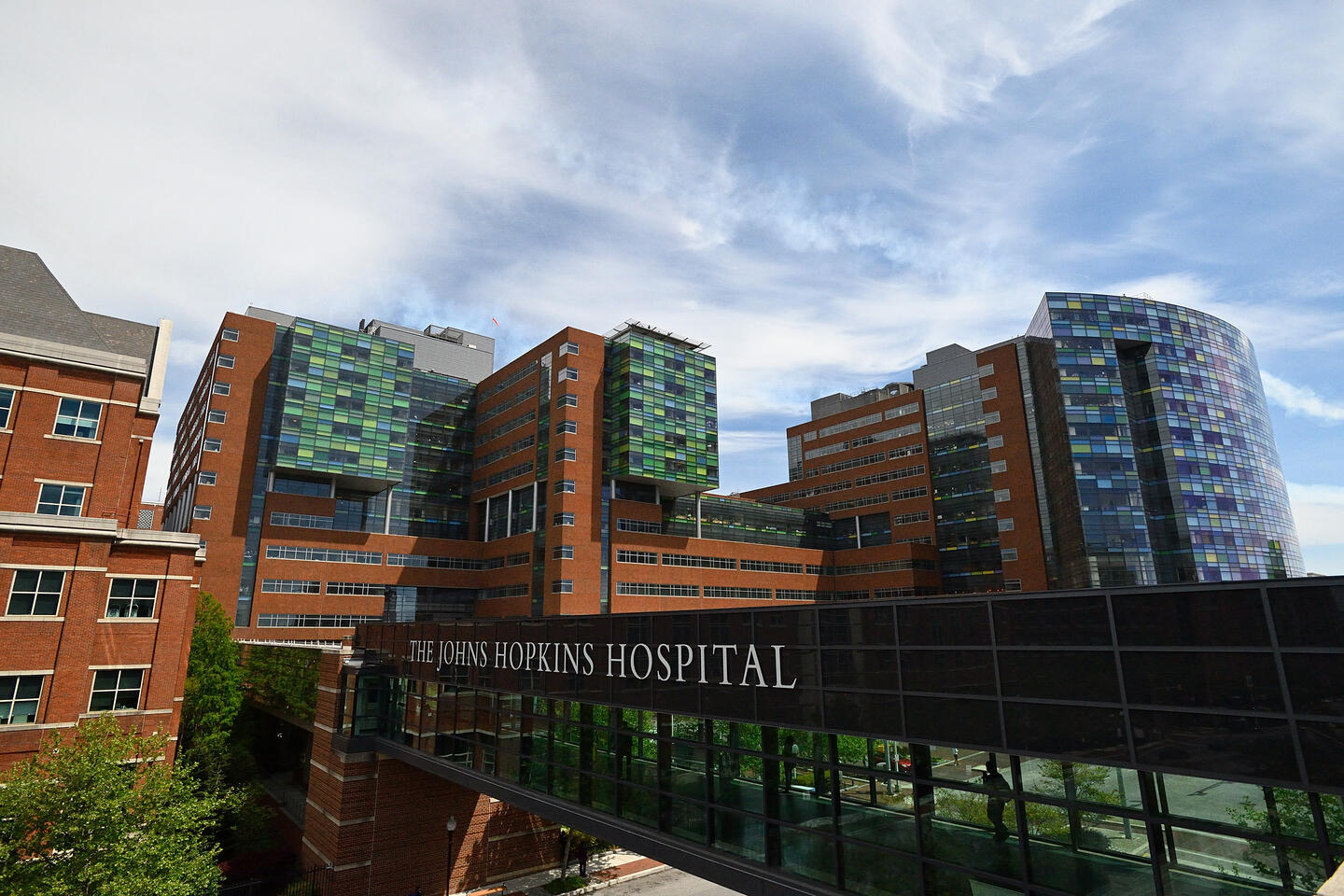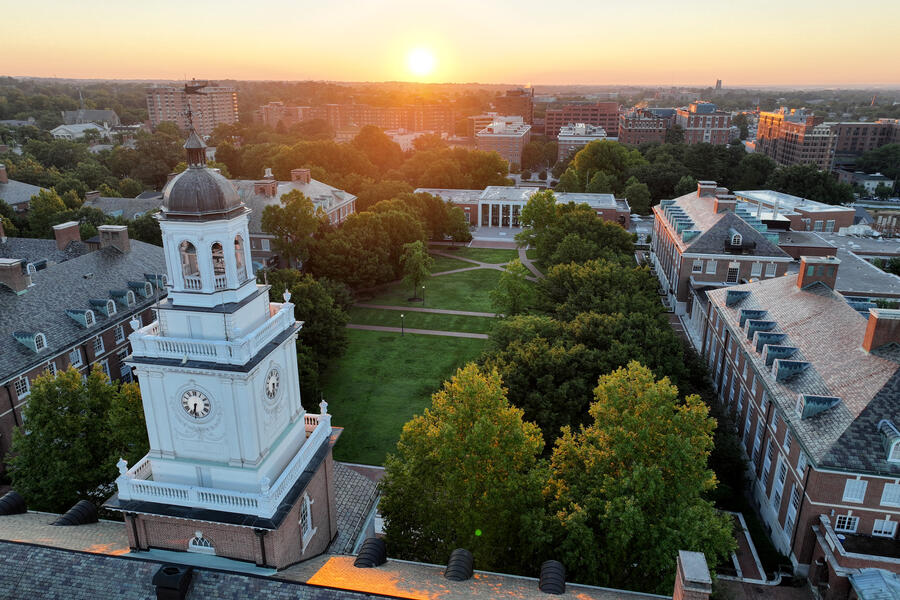- Name
- Doug Donovan
- dougdonovan@jhu.edu
- Office phone
- 443-997-9909
- Cell phone
- 443-462-2947
Johns Hopkins—the largest private employer in Maryland—delivered a $40 billion economic impact across the state last year, including supporting 149,000 jobs, according to a new analysis.
In Baltimore alone, Johns Hopkins' annual economic impact was estimated at $19.4 billion—including university and health system operations that supported one in every five jobs in the city, according to an independent analysis by Econsult Solutions Inc.
"Johns Hopkins is a vital engine of economic growth and regional vitality in every community it serves," the report states.
The HopkinsLocal program launched a decade ago has powered a significant portion of the economic benefits that have accrued in Baltimore. Since 2015, Johns Hopkins University and Johns Hopkins Health System have combined to spend more than $1 billion with local businesses, achieved by prioritizing inclusive hiring of city residents, extensive procurement with local companies, and investments in neighborhoods and community organizations.
"Johns Hopkins goes out of its way to make sure that local companies participate in their projects," said Jeffrey Hargrave, president of Mahogany Inc., a Baltimore-based commercial construction firm. "That's huge."
Hargrave's company evolved from a subcontractor to a general contractor in a few years thanks to increasing levels of work the firm received from Johns Hopkins, the Baltimore businessman said.
"Johns Hopkins made that possible," added Hargrave, whose company is involved in the construction of the Johns Hopkins Data Science and AI Institute. "The way Johns Hopkins writes its requests for proposals always emphasizes local inclusion. They really support local businesses."
Matthew Williams agrees.
As a co-founder of Mount Royal Soaps, Williams and his partners are able "to put food on the table for our families" thanks to the work it receives from Johns Hopkins. The university and health system both turned to the soap company when the pandemic caused shortages in hand sanitizer. Contracts with Johns Hopkins helped the company secure bank loans needed to expand their manufacturing and hire more employees—all in Baltimore.
"Now producing hand sanitizer is part of our business model," Williams said. "Johns Hopkins's ability to support the local economy is a big deal."
Such local inclusion has been the university's vision for more than a decade.
"Our success as an institution is inextricably tied to that of the city that we call home," Johns Hopkins University President Ron Daniels said. "Johns Hopkins has a unique obligation and opportunity as an anchor institution in Baltimore and Maryland to ensure our spending decisions help our communities flourish, and we are working with our neighbors and partners to make a meaningful impact in our city and state."
In the analysis, economic benefits are calculated from myriad sources: spending by students, staff and visitors; capital flowing to new enterprises spun out of research and development; taxes and fees paid to the city and state; partnerships with local schools and community organizations; public health and medical outreach efforts; cultural programs; athletic competitions; direct and indirect employment; contracts with vendors; and more.

Research creates jobs
Research alone conducted by the university and health system—and funded primarily by the federal government—generates a $10 billion cascade of economic impact across the state, which supports nearly 38,000 jobs in Maryland.
As a primary driver of the state's innovation economy, Johns Hopkins research generated $4.6 billion in total annual output in Baltimore alone, supporting 16,860 direct, indirect, and induced jobs with $1.5 billion in employee compensation.
"Johns Hopkins' research spending in FY2024 catalyzed widespread employment beyond its labs and academic departments," the report states. "These figures highlight how Johns Hopkins' research activity generates ripple effects across multiple sectors, reinforcing its role as a key economic engine for the region."
Johns Hopkins Technology Ventures, which helps commercialize discoveries, has helped to facilitate the creation of more than 130 startups through fiscal year 2024 that have raised $4.4 billion in venture capital—43% of which has remained in Baltimore. The analysis estimates that more than 1,000 jobs in Maryland are attributed to Johns Hopkins-affiliated startups.
Operations drive impact
In Baltimore, the day-to-day operations of Johns Hopkins University—which directly employ more than 22,000 people in the city—generated a direct annual impact of $5.4 billion and an indirect and induced impact of an additional $1 billion in fiscal year 2024.
The operations of the Johns Hopkins Health System—which directly employs an additional 20,000 people in Baltimore—drive a direct impact of $5.7 billion and produce $2.4 billion in indirect benefits. In addition, other Hopkins-affiliated health entities generated $2.3 billion in economic activity.
Combined, the operations of the university, health system, and affiliates generated nearly $17 billion in economic activity last year.
"At Johns Hopkins, we take great pride in the strong roots we've built and the powerful impact we've made in Baltimore City and across the state of Maryland," said Theodore DeWeese, dean of the medical faculty and CEO of Johns Hopkins Medicine. "This analysis reinforces that our mission goes beyond exceptional patient care—we are equally committed to driving economic growth, expanding opportunity, and strengthening the communities we serve."

Image credit: Will Kirk / Johns Hopkins University
In fiscal year 2024, the Johns Hopkins Health System provided $597 million in community benefits throughout Maryland and Washington—with the majority, $491 million, delivered in Baltimore. Such benefits include direct health services, screenings, free clinics, community building, workforce development, free and reduced medical care, and more.
"At the heart of health care is people, and our goal is to partner across communities to mindfully create and implement strategies to reinvest in people and infrastructures," said Kevin Sowers, president of the Johns Hopkins Health System and executive vice president of Johns Hopkins Medicine. "In this way we support thriving, healthy communities, compounding the value that exists at the intersection of patient care, research, and education over generations."
Together the university and health system also generated $83.5 million in tax revenue (income, sales, business, property and lodging taxes) for Baltimore and $525 million for Maryland in fiscal year 2024, according to the report.
"Beyond its role as a global leader in research and medical education, Johns Hopkins is committed to ensuring that the communities around its campuses benefit directly from its expertise—through access to exceptional health care, career pathways, and lasting opportunity," the report states. "What distinguishes Johns Hopkins is not only the scale of its economic output, but the way in which that output is connected to mission-driven goals around education, innovation, and community investment."
Building in Baltimore
Capital investments in buildings and infrastructure across both institutions produce annual direct and indirect economic benefits of nearly $1.3 billion and nearly 6,700 jobs in Baltimore.
For example, the Data Science and AI Institute planned for Homewood campus is expected to generate nearly $2 billion in economic benefits for Baltimore and Maryland during its preconstruction and construction phases from 2024-2029, including nearly 11,000 direct and indirect jobs, mostly in the city.
Over the past decade, Johns Hopkins has committed $490 million with local companies involved in design and construction projects.
Impact under threat
But Johns Hopkins, the nation's largest recipient of federal research and development funding, is currently facing unprecedented reductions to research funds as the U.S. government reduces grants from agencies such as the National Institutes of Health, the National Science Foundation, the Department of Defense, the Department of Energy, and more.
The total value of the Johns Hopkins federal research grant portfolio from January to mid-September declined by more than $500 million this year compared to the same period last year, in addition to reductions of nearly $800 million announced earlier this year due to U.S. Agency for International Development grant terminations. Those actions forced Johns Hopkins to make its largest layoffs in its history.
A new study by The Brookings Institution found that cuts to the National Institutes of Health will result in "meaningful employment losses" for local economies with large amounts of NIH funding.
"The innovations that result from this research generate investments that spur economic activity across the country. The economic impact may also be felt at the local level," the report states. "Cutting [NIH] funding may be detrimental to the community."
Still, Daniels said, "Even as we navigate a challenging environment for higher education, we will continue to pursue our founding aim to be part of Baltimore's success as it is part of ours."
Posted in University News, Community
Tagged baltimore, johns hopkins, johns hopkins health system, economic development








